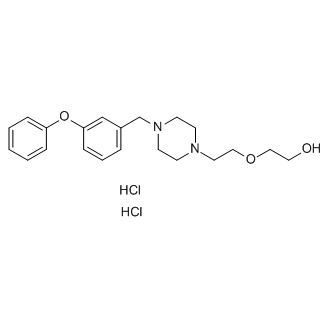| Size | Price | Stock |
|---|---|---|
| 5mg | $60 | In-stock |
| 10mg | $90 | In-stock |
| 25mg | $150 | In-stock |
| 50mg | $250 | In-stock |
| 100mg | $450 | In-stock |
| 200 mg | Get quote | |
| 500 mg | Get quote | |
| We match the lowest price on market. | ||
We offer a substantial discount on larger orders, please inquire via [email protected]
or Fax: (86)21-58955996
Inquiry for price and availability only. Please place your order via our email or fax.
| Cat. No. : | HY-101038A |
| M.Wt: | 429.38 |
| Formula: | C21H30Cl2N2O3 |
| Purity: | >98 % |
| Solubility: | DMSO : 27.5 mg/mL (64.05 mM; Need ultrasonic); H2O : 50 mg/mL (116.45 mM; Need ultrasonic) |
ZK756326 dihydrochloride is a nonpeptide chemokine receptor agonist for the CC chemokine receptor CCR8. IC50 & Target: IC50: 1.8 μM (CCR8)[1] In Vitro: ZK 756326 inhibits the binding of the CCR8 ligand I-309 (CCL1), with an IC50 value of 1.8 μM. ZK 756326 is a full agonist of CCR8, dose-responsively eliciting an increase in intracellular calcium and cross-desensitizing the response of the receptor to CCL1. ZK 756326 stimulates extracellular acidification in cells expressing human CCR8. Binding competition assays are performed on a series of other G-protein-coupled receptors to determine whether the interaction of ZK 756326 is specific for CCR8. In these assays, ZK 756326 is tested at 50 μM for inhibition of radiolabeled ligand binding. At this concentration, ZK 756326 shows >28 fold specificity for CCR8 compared with 26 other GPCRs, all with IC50 values of >50 μM. There is less selectivity when ZK 756326 is tested against the serotonergic receptors 5-HT1A, 5-HT2B, 5-HT2C, 5-HT5A, 5-HT6, and the adrenergic receptor α2A, in which IC50 values of 5.4, 4,4, 34.8, 16, 5.9, and <20 μM (at 20 μM 65% inhibition), respectively, are observed. The compound is unlikely to be an agonist on these biogenic amine receptors, because when tested at concentrations up to 10 μM on a representative receptor, 5-HT1A, it shows no agonist activity in a GTPγS binding assay[1].
Lorem ipsum dolor sit amet, consectetur adipisicing elit. Autem earum hic iste maiores, nam neque rem suscipit. Adipisci consequatur error exercitationem fugit ipsam optio qui, quibusdam repellendus sed vero! Debitis.
Inquiry Information- Product Name:
- ZK756326 (dihydrochloride)
- Cat. No.:
- HY-101038A
- Quantity:


Your information is safe with us.